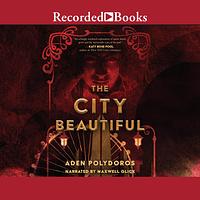You need to sign in or sign up before continuing.
Take a photo of a barcode or cover
adventurous
emotional
informative
inspiring
fast-paced
Plot or Character Driven:
A mix
Strong character development:
Complicated
Loveable characters:
Yes
Diverse cast of characters:
Yes
Flaws of characters a main focus:
No
The City Beautiful is dark, sinister and thrilling story of a Jewish boy and the wonderful beast that was Chicago in 1893, when all the odds are stacked against him.
The plot is gripping and mysterious and there was a lot more action than I was expecting, and the stakes and the obstacles rise with every the of the page. There is definitely a creepy element to the story, which the author amplifies with their writing and the dark atmosphere of the city.
Our protagonist, Alter, is possessed by the ghost of his best friend Yakov, someone who he really cares deeply about and someone who now wants him to avenge his death.
Alter himself is a very likeable character- he's loving and kind and brave but he's also afraid of a facing a lot of things, he's loyal but he can still hurt people and ever conflict of his personality makes great to follow around.
We also meet another character, frank, who is quite the opposite of alter but equally important. He's kind of like a secret crush of Alter, but also a kind of a high school bad boy except on the streets of 18th century Chicago. Just the way his presence turns up the tension and emotions in every scene is so fun to see.
This book also tackles the topics of race, sexuality, religion and the political and social issues that were in that era and I really thought it was brilliant how the author made the setting and the timeline work towards making the story more high stakes and deep.
The plot is gripping and mysterious and there was a lot more action than I was expecting, and the stakes and the obstacles rise with every the of the page. There is definitely a creepy element to the story, which the author amplifies with their writing and the dark atmosphere of the city.
Our protagonist, Alter, is possessed by the ghost of his best friend Yakov, someone who he really cares deeply about and someone who now wants him to avenge his death.
Alter himself is a very likeable character- he's loving and kind and brave but he's also afraid of a facing a lot of things, he's loyal but he can still hurt people and ever conflict of his personality makes great to follow around.
We also meet another character, frank, who is quite the opposite of alter but equally important. He's kind of like a secret crush of Alter, but also a kind of a high school bad boy except on the streets of 18th century Chicago. Just the way his presence turns up the tension and emotions in every scene is so fun to see.
This book also tackles the topics of race, sexuality, religion and the political and social issues that were in that era and I really thought it was brilliant how the author made the setting and the timeline work towards making the story more high stakes and deep.
This was everything I needed in a spooky historical fantasy! It is both a beautiful love letter to Jewish culture and history, and a chilling insight into the horrifying discrimination faced by Jewish individuals. The book starts with an intriguing mystery and quickly develops into a nerve-wracking race against time and the dybbuk’s possession of Alter. I loved not only the camaraderie and friendship shown, but also the LGBTQ+ representation, which is wonderfully done. Filled with vivid imagery, dark secrets and paranormal Jewish folklore, this is one that everyone should read. Thank you so much to @harper360ya and @adenpolydoros for my copy in exchange for an honest review.
adventurous
dark
emotional
hopeful
mysterious
reflective
sad
slow-paced
Plot or Character Driven:
Plot
Strong character development:
Yes
Loveable characters:
Yes
Diverse cast of characters:
Yes
Flaws of characters a main focus:
Yes
dark
sad
slow-paced
Plot or Character Driven:
Plot
Strong character development:
Yes
Loveable characters:
Yes
Diverse cast of characters:
Yes
Flaws of characters a main focus:
Yes
I bought The City Beautiful by Aden Polydoros because I am obsessed with everything related to the 1893 Columbian Exposition, which happens to be surprisingly underrepresented in historical fiction. Thus, I was intrigued by this book because of its historical setting.
Blurb:
Alter Rosen is a seventeen-year-old Jewish immigrant who turned his back on a life of crime and wants nothing more than to keep his head down and work to buy his family’s passage from Romania to the United States. When his friend Yakov dies in a mysterious “accident,” Alter recognizes an ominous pattern of Jewish boys who go missing. Alter is spurred to avenge Yakov’s killer after he is possessed by Yakov’s dybbuk, or spirit, and he unwillingly ends up working with an old friend from his criminal days, Frankie. Alter struggles between his forbidden desire for Frankie, his need to avenge Yakov, and his resolution to be a law-abiding member of his religious and civic community as he finds himself confronting the wealthy and powerful who control Chicago.
Helpful Note:
If you are anything like me and do not recognize the many Yiddish words and phrases used in this book, the glossary is at the back of the book!
If you are anything like me and do not recognize the many Yiddish words and phrases used in this book, the glossary is at the back of the book!
Review:
The strongest parts of The City Beautiful rest heavily on Polydoros’s strong character work, especially with the protagonist, Alter. Alter, despite being a little pathetic, is a believable and likable character and his voice shines through on every page. His motivations and development are easy to track as the plot escalates. Side characters such as Raizel and Frankie, although significantly less developed than Alter, are similarly likable and fun to read about.
The prose in the book is adequate most of the time, although Polydoros has an annoying habit of repeating certain phrases too often. Some of these phrases stuck out to me as particularly amateurish or fan-fictiony, such as “purred” or “my knees weakened.” The most annoying offense is that he describes one character’s eyes as being “sepia-colored” at least four times. Whenever he used these words or phrases, I was pulled out of the story.
The biggest flaw of this book is that Polydoros tries to do too much all at once, resulting in a story that feels claustrophobic and underdeveloped. Each individual element captured my interest—the backstories of the characters, the Jewish mythology, the dybbuk possession, the Chicagoan history, the queer love story, the mystery of the missing boys—but none was addressed with enough detail or complexity to sustain my attention. The book felt especially bogged down by the complicated plot in the last quarter, and I had to push myself to keep reading at times. The villains, in contrast with the main characters, came across as flat and one-dimensional. The City Beautiful could be significantly improved if the author either cut certain elements to focus on others or if he had expanded the book to address everything adequately.
As a history major who specializes in this time period, my expectations for historical accuracy are far more stringent than the average reader’s. I am pleased to say that the author gets the big details right. There were no glaring errors or inaccuracies that I picked up on, although I am not well-versed in Jewish immigration history. He captured the most important trends of the time and place, especially when it came to America’s class divide and industrialization.
***The rest of this review lies more in the realm of personal taste rather than objective criticism***
Modern historical fiction authors inevitably bring their biases and agendas into their stories, which can create tension when they want to create stories that are set in the past, yet at the same time champion certain contemporary ideas about identity and class. They especially face this tension when writing about queer relationships, because although queer people (at least how we think of them today) certainly existed in the past, people in the nineteenth century navigated gender in ways that can substantially deviate from the twenty-first-century paradigm. Authors can either research nineteenth-century gender and sexuality and attempt to create queer characters who accurately reflect how someone in that time period would think about gender and sexuality—even if that means writing about things that make modern readers uncomfortable or confused—or they can mold their characters in a way that appeals to current gender ideology. Either choice is completely valid, although I personally find the latter more interesting, and I find it difficult to suspend my disbelief when certain historical characters act anachronistically. Polydoros attempts to keep the historical situation in mind when he writes the queer relationship within The City Beautiful, yet for the most part, it feels quite modern.
I cannot speak to the historical portrayal of Jewishness, but my guess would be that it shares similarities in historical accuracy to the portrayals of queerness. At times, the author inserts what are clearly modern academic arguments about race, religion, and gender into the text, hitting the reader over the head with his viewpoint. To be clear, I do not mind historical fiction stories that have an agenda or something to say that pertains to modern society. However, I appreciate it when the issues are tackled with subtlety and sensitivity for the historical time period.
The Run-Down:
You will probably like The City Beautiful if you love the idea of a queer Jewish historical fiction fantasy/mystery, enjoy books in the Young Adult category of literature, and want to learn more about Chicago and Jewish culture/immigration in the 1890s.
You might not like The City Beautiful if you are uncomfortable with any of the content warnings (this book can be quite graphic and dark), if you dislike tropes commonly found within Young Adult literature, if you dislike historical fantasy, or if you are looking for a complex, nuanced dive into historical issues of race, religion, and queerness.
A Similar Book:
The Witch Haven by Sasha Peyton Smith. Similarities between these two books include:
· A Progressive-Era American setting
· Fantasy elements
· A protagonist who tries to solve the mysterious murder of someone close to them and uncovers the dark side of society’s ruling class in the process
· Romance
· Social justice themes
Graphic: Death, Hate crime, Homophobia, Violence, Blood, Antisemitism, Religious bigotry, Death of parent, Murder, Fire/Fire injury, Classism
Moderate: Child death, Genocide, Gun violence, Misogyny, Pedophilia, Racial slurs, Rape, Sexual violence, Alcohol
Minor: Animal cruelty, Animal death, Drug use, Suicide, Forced institutionalization, Abandonment
emotional
mysterious
sad
medium-paced
DNF. Historical isn't my favorite genre. But when a publisher sends me a book directly, I try to give it a go. This one just isn't for me. It's slow moving (at least the first part I read) and I'm unfamiliar with a lot of the Yiddish words. Some I know and some I can get from context, but quite a few are wholely unfamiliar.
adventurous
challenging
dark
emotional
mysterious
tense
slow-paced
Plot or Character Driven:
Plot
Strong character development:
Complicated
Loveable characters:
Complicated
Diverse cast of characters:
Complicated
Flaws of characters a main focus:
No
dark
sad
tense
slow-paced
Plot or Character Driven:
Plot
Diverse cast of characters:
Yes
adventurous
challenging
dark
fast-paced
Plot or Character Driven:
A mix
Strong character development:
Complicated
Loveable characters:
Yes
Diverse cast of characters:
Complicated
Flaws of characters a main focus:
Yes





